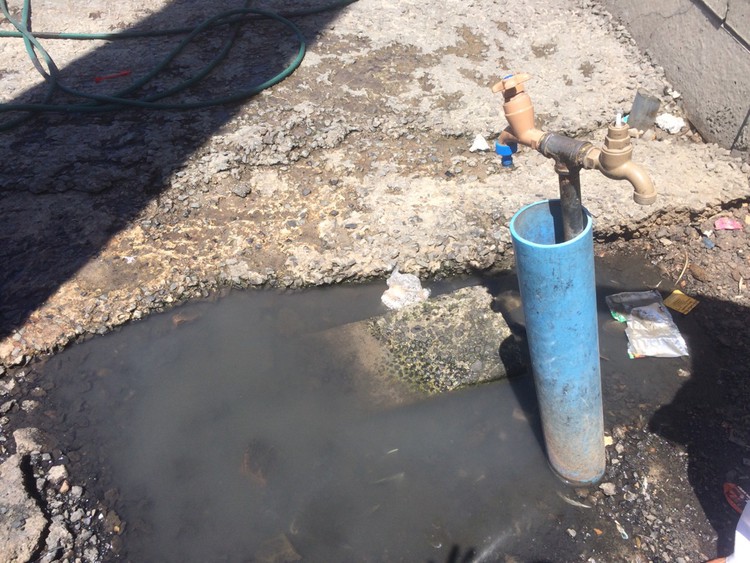Water crisis: it makes no difference to us, say residents of informal settlements
Cuts won’t affect households who get their water from standpipes anyway
For residents of Cape Town’s informal settlements, tighter water restrictions won’t make any difference.
If the City of Cape Town has to move to Phase 2 – Disaster Restrictions – of its drought response plan, some households in formal settlements will no longer have running water and will have to fetch drinking water from “points of distribution”.
But nothing will change for households in informal settlements, which get their water from standpipes anyway.
Cape Town is currently in Phase 1, or “Preservation Restrictions” of its disaster plan, which involves “water rationing through limiting supply and advanced pressure management”. Phase 2 is the “Disaster Restrictions Phase”, and Phase 3 the “Full-scale disaster implementation”.
The Mayoral Committee Member for Informal Settlements, Water and Waste Services, and Energy, Xanthea Limberg, said that if the City moved to Phase 2, informal settlements would be prioritised.
During this phase, water collection sites or Points of Distribution (PODs) will be established around the city, and some households in formal settlements will not have access to piped drinking water. Informal settlements will continue to receive water from standpipes.
Limberg said: “The City recognises the vulnerability of informal settlements and will prioritise these communities, where possible given infrastructure viability. This means that they will continue to receive water through normal channels, which is through standpipe taps near their homes. As the informal settlements already have access to tap stands, these residents would not need to walk or drive to water points of distribution. This means the water reticulation network will continue to supply informal settlements but, in the general case, residents in formal residential areas will need to collect water from PODs.”
Residents of informal settlements say the drought has made no difference to the problems they already have with access to water.
Thabo Lusithi, who lives in Khayelitsha and is a member of the Western Cape Water Caucus, says informal settlements in Khayelitsha continue to have the same issues as before the drought. Many households share the same standpipe; there are problems with water pressure; and periods when the pipe stops functioning altogether.
A resident of an informal settlement in Dunoon, who asked not to be named, said nothing had changed with her water supply since the drought began. She said the water standpipe she shared with 20 other households leaked, and there was no drain. Water pressure varied and sometimes the pipe did not operate for a whole day, she said.
According to the 2011 Census, 12% of the 1,068,572 households in the City of Cape Town received tap water from a communal stand.
Support independent journalism
Donate using Payfast

Don't miss out on the latest news
We respect your privacy, and promise we won't spam you.
Next: Attempted land occupation in Kraaifontein
Previous: Katlehong family evicted over home loan arrears of R1,000
Letters
Dear Editor
It is understandable that people living in the survivalist realm associated with the minimum service provision like communal standpipes might think that drought or no drought conditions are the same for them.
However such resigned complacency could The City, despite its plans for boreholes and desalination plants, will be hard-pressed to deliver anything like the normal water-provisioning and, importantly, sanitation services, to everyone, rich or poor. Politicians and officials will no doubt try to provide an average of 20 litres per person per day as recommended by the World Health Organization, via trucks, distribution points and sporadic main-line supplies, but the be jolted if day zero were to arrive, in the first quarter or so of 2018.
The practical implementation of this, on the face of it, fair and playing-field-leveling, policy will be disruptive to everyone. As the grip of drought tightens so will security around distribution - leading to increased frustration, resentment and competition. Water-borne sanitation is unlikely to be able to function at anywhere near design specifications and most workplaces will have their production or service delivering functions severely curtailed. This will have implications for regularity of employment with ripple effects impacting health, education and food security.
It would be wise for every segment of society and every community seriously consider its options and work at practicable responses to grave water shortages so as to avoid the shock of a sudden wake-up call.
© 2017 GroundUp. 
This article is licensed under a Creative Commons Attribution-NoDerivatives 4.0 International License.
You may republish this article, so long as you credit the authors and GroundUp, and do not change the text. Please include a link back to the original article.

